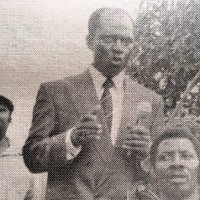 The headlines are dominated lately by the outbursts of the governors of the Centre and Littoral Regions who have signed two decrees banning undeclared public meetings and public demonstrations and the intervention of the Minister of Territorial Administration, Mr. Atanga Nji who in a fax message addressed to the administrative authorities to "put in place [a] monitoring system for all activists and supporters [of the said] political party", reminding them that "it is understood that unauthorized demonstrations remain prohibited" and that they must proceed to the arrest, detention and administrative custody of offenders who exceed the said prohibitions.
The headlines are dominated lately by the outbursts of the governors of the Centre and Littoral Regions who have signed two decrees banning undeclared public meetings and public demonstrations and the intervention of the Minister of Territorial Administration, Mr. Atanga Nji who in a fax message addressed to the administrative authorities to "put in place [a] monitoring system for all activists and supporters [of the said] political party", reminding them that "it is understood that unauthorized demonstrations remain prohibited" and that they must proceed to the arrest, detention and administrative custody of offenders who exceed the said prohibitions.
While in the first case the prohibition by the governors of unauthorised meetings and demonstrations is highly questionable, in the second case the intention of the Minister of Territorial Administration to restrict the freedom of public meetings and demonstrations is evident when he speaks of unauthorised demonstrations even though they are placed under the regime of declarations.
Some people who defend the spirit and the letter of the Message-Fax of the Minister of Territorial Administration invoke the International Covenant on Civil and Political Rights, which states in Article 21 that "The right of peaceful assembly is guaranteed. The exercise of this right shall be subject only to such restrictions as are prescribed by law and are necessary in a democratic society in the interests of national security or public safety, public order, or for the protection of public health or morals or of the freedoms of others". In an attempt to swallow the view that even conventions provide a framework for public meetings and demonstrations that are not free in absolute terms.
According to Article 21, it is for the Government to demonstrate first of all to national and international public opinion that there is indeed "an offence against national security, national safety or public order". Such restrictions can be imposed only after a real assessment of those risks has been made. This can only be done after the fact, i.e. once the demonstrations have taken place. This is the case of the yellow jackets in France, which have been used in assaults by breaking and destroying public buildings. It was only subsequently that the French government, because the yellow jackets' demonstrations were no longer peaceful, took measures to restrict or ban them. This is the spirit of Article 21.
Examining Article 21, "the exercise of this right may be subject only to such restrictions as are imposed IN ACCORDANCE WITH THE LAW".
Law n°90/055 of 19 December 1990 indicates that the regime of public meetings and demonstrations is declaratory. Once the conditions of form have been met, the TERRITORIALLY COMPETENT administrative authority immediately issues a declaration receipt. Though it is true that Article 8.2 of the Law of 19 December 1990 gives the administrative authorities the latitude either to prohibit public demonstrations or to move the place where they take place, it should be noted that this provision is contrary to the Constitution of 18 January 1996, which is subsequent to this law and which deserves to be reviewed.
The assessment of the dangerousness of a public demonstration, if it is to take place, should obviously be made after the declaration of the said demonstration. This assessment cannot be made a priori. Moreover, by law, nowhere is it stated that the prohibition of a public demonstration is the responsibility of the minister in charge of territorial administration.
With regard to public meetings, the authority cannot prohibit a declared public meeting (cf. Case of Germinal v. State of Cameroon).
Minister Atanga Nji exceeded his powers. With regard to demonstrations or public meetings, the Minister of Territorial Administration can only intervene in case of a state of emergency or a state of exception decreed by the President of the Republic who has exclusive competence. In such cases, the Minister may issue an order specifying the procedures for exercising or applying this state of emergency or state of exception. To date, the President of the Republic has never decreed either a state of emergency or a state of exception. Consequently, the message conveyed by Minister Atanga Nji is liberticidal, anti-democratic and unconstitutional.
In conclusion, it should be recalled that the main indicator of a country's level of democracy is freedom. If freedom is not expressed or manifested, it is because it does not exist. The message of Minister Atanga Nji is the proof that we are not in democracy in Cameroon but in democracy which is dictatorship dressed in democratic garments. Cameroon is definitely reaching the bottom in terms of fundamental freedoms of the citizen. In terms of freedom in general.
Jean Robert WAFO
Minister of the shadow cabinet of the SDF in charge of information and media




